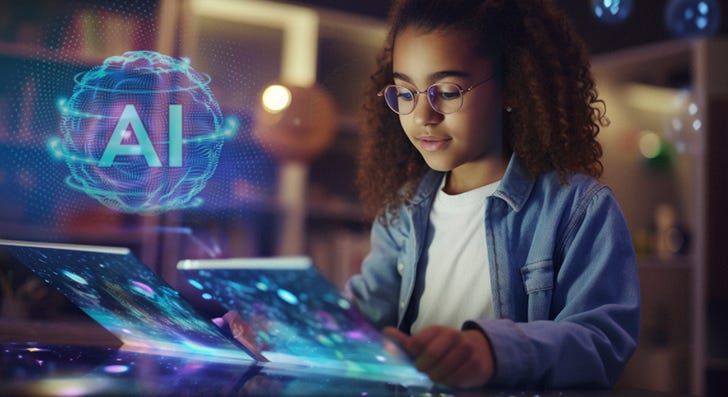What is Generative AI in Education? Benefits and Challenges | by Aileen Scott | May, 2024

Artificial intelligence has gained much traction today, owning to its magnificent benefits across all industries. The market size of generative AI is continually growing. A wide variety of industries, including education, is understanding its true potential to usher positive changes.
If you are wondering what generative AI is, its benefits and challenges, then here we explore everything about generative AI in education.
What Is Generative AI in Education?
The terms artificial intelligence and generative AI have become intensely popular. AI refers to the machine simulation of human intelligence, allowing the machines to perform human tasks like problem-solving and learning. Generative AI is a form of artificial intelligence that uses machine learning algorithms to generate new information. This type of AI can identify trends, draw patterns from existing data, and provide new content. Generative AI in education develops meaningful content and learning outcomes, aligned with desired curriculum.
So, a generative AI in education creates human-like content, responds to questions or instructions, etc., using deep learning models.
What are the Advantages of Generative AI in Education?
Generative AI is reshaping the educational industry. It has the potential to redefine learning experiences and improve results. Here we list the main benefits of AI in education:
➥ Wide Learning Resources
One of the main advantages of generative AI is to produce learning resources like questions, exercises, quizzes, eBooks, etc. These are helpful for the students. Even the teachers can use generated learning materials and enhance student engagement. Due to the diverse learning concepts, the teachers also learn with the students.
➥ Higher Accessibility and Inclusivity
Generative AI has broken the barrier of traditional limited education accessibility. It boosts education accessibility and inclusivity. Students with disabilities can use AI-driven tools and get real-time captions. This technology can translate materials into different languages for the students. It can also adjust the content to match their unique needs.
➥ Boosts Creativity
One of the benefits of this educational technology is providing interesting learning opportunities to the students and enhancing talent-realization. Generative AI enhances creativity by inspiring the students to create original content like videos and audio of music, art, stories, etc. The students discover their artistic side and can tap into their talent. This artistic freedom allows them to experiment with different genres and ideas and cultivate a feeling of positivity, confidence, and self-esteem. This technology promotes curiosity and engagement, leading to profound learning and discovery.
➥ Student Engagement Enhancement
Generative AI fosters student interactivity and engagement. It makes their learning journey more exciting by introducing simulations and gamification. These thrilling learning experiences allow the students to delve deeper into complicated concepts. This improves their concept understanding and retention. Such interactive and captivating learning experiences enhance student experience.
➥ Provides Personalized Education
The role of generative AI in education system also extends to personalizing the learning experience. Leveraging this technology, you can customize the learning content for the students. AI algorithms can assess student data, identify patterns, detect strengths and interests, determine the scope of improvement, and measure their performance. You can provide relevant and meaningful individual feedback by identifying each student’s learning potential. Based on the data provided by AI algorithms, you can adjust their learning activities, content, and curriculum to meet students’ requirements.
With more learning personalization, the students find themselves more engaged and motivated to excel in their studies, work on their weaknesses, and enhance their knowledge.
➥ Promotes Adaptive Learning
Adaptive learning is critical to the bright future of AI in education. It is critical to look at the unique learning needs of each student. The adaptive model creates a customized learning path for each student. Experts believe that the students are more engaged when they receive immediate feedback. Also, adaptive learning systems can track a student’s real-time data, evaluate progress, prepare assignments, and assess their learning abilities.
What are the Challenges of Generative AI in Education?
Generative AI in Education also faces logistical, ethical, and societal obstacles.
➥ Integrity
As we know, generative AI learns from existing data. If this data is biased, its implication will also be felt in the generated output. So, educators must assess the data and maintain its integrity frequently.
➥ Security
Privacy and security is another concern for generative AI systems. This technology needs huge amounts of data that may include sensitive student information. The data is always exposed to breaches and unauthorized access. To manage the challenge, the educational institutions must look forward to developing high-tech systems that protect student data and ensure privacy.
➥ Digital Gap
One of the important considerations is to bridge the digital gap and eliminate disparities in education. Some disadvantaged students cannot access technology and experience AI learning benefits. Closing this gap needs robust infrastructure, higher accessibility, and strong integration of AI in education.
Wrapping Up
Generative AI’s role in education has gained prominence in the last few years. It offers a lot of benefits to learners and teachers. Incorporating generative AI in education can transform teaching methods, develop skills, and make students future-ready, where AI will play a key role in their personal and professional lives.



